We’ve talked to LingPlay studio about their new game – a battler «Heroes and Puzzles», which was featured in Canadian Apple App Store in June.
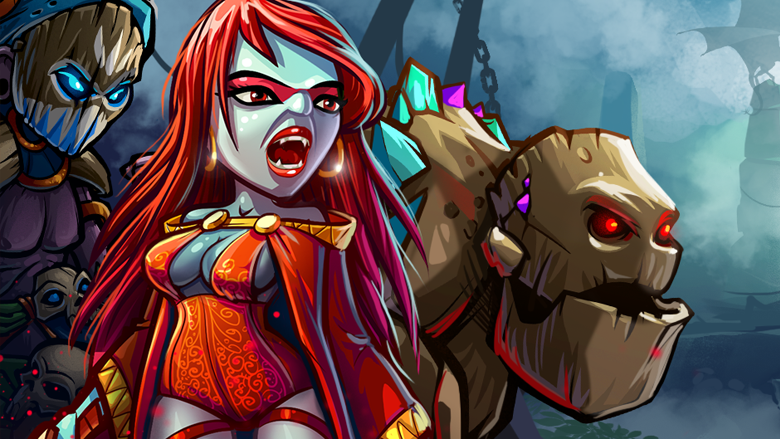
Image Credit: Heroes and Puzzles
Why match-3?
Match-3 is one of the most simple core mechanics, it’s easy to understand and has no entry barriers. However, we wanted more than a usual match-3 game, with the market being overcrowded with too many pure match-3 games. From the very start, we knew it should be something different, and we decided it would be a hybrid of a match-3 and an RPG. The idea got the attention of many publishers from the very early stages of development, and we received several publishing offers at once.

Sergey Arapov, Producer at LingPlay
It also was a great help that we had Roman Povolotskii as our external producer; he has extensive experience in developing match-3 games with a strong metagame; in addition, I had previous experience working on games for social networks, including match-3 games based on PVP-mode, before joining LingPlay.
In Heroes and Puzzles, match-3 mechanics is used for battles only, and the rest of the game can be referred to as RPG-like (by analogy with the Rogue-like).
The market is overcrowded with match-3s (including midcore). Any concerns that the audience is tired of it?
It’s not like all people are that sort of gamers who want games complex and serious. This is analogous to the way that everyone listens to the music, watches movies, and TV shows, but only a small audience should be considered music lovers and film fans. Therefore, match-3 games will always have their audience.
Considering smartphones are getting more and more affordable, and thus, widespread, the number of casual players is increasing as well. At the same time, there are casual players who have been playing games for ages now, and they are tired of casual games and ready to play something a bit more serious, but no way hardcore.
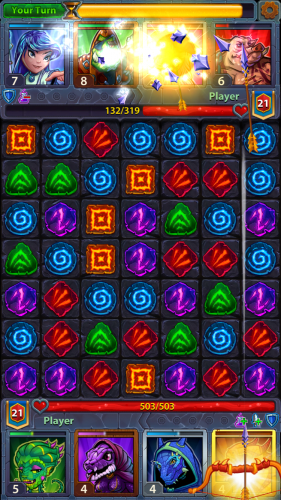
It is this audience we are focused on: players on the border between casual and midcore. A casual player won’t be “suffering” in our game, he will feel comfortable, but involved. A midcore (or hardcore) player will be “relaxing”, but he still will have to be focused on finding the ideal solution, to think over various tactical decisions in the metagame. Of course this a “shifting” audience – some players will go back to playing more casual games, while some will go to midcore and hardcore games – but part of the audience will remain. Plus, there will always be an inflow of new, “maturing” casual players. That’s why despite the constant churn, the audience will be a more or less consistent and steadily increasing group.
It is very common that battlers are too complicated, have too many features, create high entry barriers for the casual players, and fail to offer something really strategic for hardcore players. We deliberately stay away from hardcore elements and stay simple, but still, employ a full-fledged RPG.
How long have you worked on the project? What was your team?
We have been working on the game for a little over a year. There have been a few breaks, and the majority of the project was carried out by 3 programmers, 2 artists, an animator and game designer, 2 testers, the Project Manager, an internal producer, and external consultant.
If not a secret, what are your development sources (outsourcing, old projects, an investor)?
All of those. We have an unusual history for an indie game studio.
In 2011, the mobile games industry was booming, and you could hear all kinds of stories of grand success. That’s when brothers Almaz and Azat Maksutovs decided to try with mobile games, despite the fact that their partners considered this to be too costly and risky. The brothers set themselves a goal: to create a company in Ufa with conditions and opportunities for employees that would lead to the creation of great games and allow them to successfully compete in the international market of mobile games.
It was their faith in the gaming industry and their ambitions to build a successful gaming company in a Russian province which helped an unknown team of enthusiasts with a minimum of experience to create Sheep Happens, which was later published with Kongregate. The game got many positive reviews and feedback from players and was featured several times on iOS and Android in 2012. The money which we made then with Sheep Happens was later used for developing other projects, including Heroes and Puzzles. We have also done some outsourcing for Russian and European game companies.
What difficulties did you face while developing the game and how did you solve them?
Most of them were because Heroes and Puzzles is a larger and more complicated project than anything we had done before. We underestimated the complexity of the implementation of certain parts and set the bar at a higher level than we could achieve without running into some hitches.
For example, we decided from the very start that we were making a game with both online and offline activities. This gave way to a lot of complicated technical problems and increased the development period, but eventually became one of our trump cards. So we had to work on both, single campaign and PvP-mode, and we had to be great at both. It increased the development time, but eventually allowed us to meet the demands of the majority of our users.
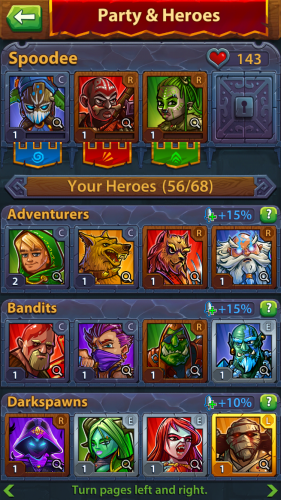
Also, during pre-production and prototyping, we underestimated the complexity of certain game mechanics for players. We realized this later, and as a consequence, we had to cut out some of the already-finished parts.
We spent a lot of time and resources on the visual part of the game as well. We aimed for better quality visuals than most similar games have from the very start, and we tried to keep the art and animation at a high level of quality, too. If something turned out to not be good enough, we remade it until the result met our requirements.
All of these problems we solved on our own, and that meant a longer development period than we planned originally, but in the end, we are proud of what we have today.
When we finished the playable demo version of the game and the publishers who were ready to launch the game had lost their interest, so we decided to do the technical launch and soft launch ourselves. The good thing is that we now have this experience under our belts, and it helps a lot when building relationships with publishers. The most important part is that we saw all the errors we made, learned from them, and now, we have the experience we need.
My favorite (and as far as I know, one of the most popular) question – how does the runes thing work?
Since Heroes and Puzzles is not a “pure” match-3 game, and it has PvP mode, we decided we will not manipulate a player by controlling runes’ drop. That’s why it’s random, with the only restriction that there should be no ready combinations in dropping runes.
The balance in the game is not about how runes drop, but about the roleplay superstructure. In fact, collecting the combinations can be compared to throwing the dice in a board RPG – it all depends on player’s luck. So the luckier you are, the faster your heroes’ abilities charge, and the faster they are activated.
A player can simply move three runes in a row without much thinking, but to progress steadily, he has to consider the color of his heroes, their abilities, the color of the enemy heroes and their abilities, etc.
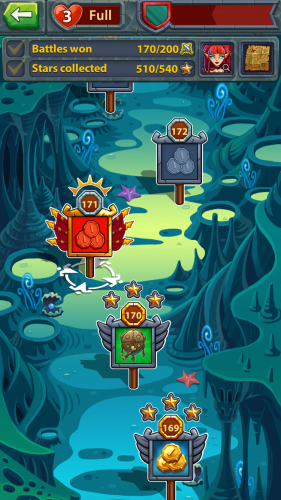
But – and this is an important point – the player has to take actions only within the field. That is why heroes’ abilities are triggered automatically, without manual activation by players – so that the player stays focused only on collecting combinations, and the game does not become too complicated. We did prototype manual activation, and while it made the game more tactical, it also made it more complicated. That led us away from the post-casual audience to midcore/hardcore players, and we are not ready to go there yet.
Game complexity: does it change dynamically, depending on the success/failure of the player on the battlefield?
No, we refrained from using such manipulations. In Adventure mode (single campaign) we don’t control runes’ drop and the AI’s behavior and “intellect” don’t change. We have a linear complexity increase, balanced on a planned progress of the player’s heroes and items in his use.
Even the AI does not know exactly which runes will drop, but it is good at analyzing various combinations of runes, player’s and its own characters’ abilities, and is able to pick up the most effective moves. So the whole trick is about deep analysis and understanding of the tactical nuances, and the AI gets smarter and smarter in Adventures.
My experience of Heroes and Puzzles is not exactly extensive (about 20 missions), but I noticed that you have chosen not to diversify the gameplay. Other match 3 games often try to offer additional features (like obstacles, ice, chocolate, etc.). You refuse to do this. Why?
The main focus of the game is the roleplay elements. Collecting runes is just a randomizer which considers the luck and skills of a player — his attentiveness, ability to calculate sheds, and to effectively to choose runes wisely depending on the situation on the battlefield.
Our game is not about solving puzzles through collecting runes, it’s about how to use combinations to charge your heroes, how to activate their abilities in correct order, and how to block the opponent from being effective. The metagame is about how to form an effective party, which equipment to use, which modes and how much to play, and how to get new characters and equipment.
To put it shortly, Heroes and Puzzles is a simple but full roleplay game, where a battle is given through easy and familiar-to-all match-3 mechanics.
The game is a battler. But you don’t have a classic card system. Why and how did you replace it?
Since our goal was not copying or imitating a roleplay game, but to create a simple one, we initially refused from the traditional multi-stage fusion and evolution in favor of the role-playing mechanics.
In our game, heroes upgrade through gaining experience points, which heavily depend on the amount of damage inflicted by the party. To increase the efficiency of the party, the player has to engage in equipment management: getting new items, equipping characters, reforging items, etc.
Regarding collecting heroes, we try to turn it into game mechanics rather than an optional activity: the player can earn extra bonuses, form a party from a set of heroes, and in the nearfuture, we want to make this bonus constant. Thus, the players will have to collect all the characters, and not stick only with their favorites.
In one of our latest update, we added chests to increase the attractiveness of PvP mode, which is designed to increase the retention of players, and to keep them even if they have completed all available areas of Adventure. Chests are given to players after a victory at the Arena. The content is free, but a player has either to wait for some time to get it unlocked, or spend coins.
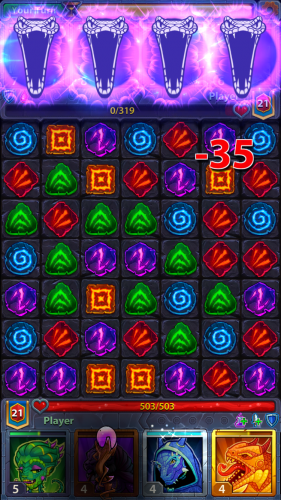
We still plan to add “dusting” of items instead of selling, and add evolution of items and heroes. But that will not be about collecting necessary additional items or heroes (in our game reacquiring the hero gives level-up, and similar items are unique), but about collecting and spending dust and coins.
We believe these mechanics will work well with collecting chests and dusting and evolution of items, and that players will be able to maintain the relevance of favorite characters.
Many battlers like Heroes Charge have mechanics which is largely based interaction of the characters, on their specialization and synergies. If I am correct, you have decided to go another way. Tell us about how do heroes work in the game.
Similarly. When designing heroes, we initially focused on typical MMORPG roles — we have damagers, tanks, buffers, debuffers, and the subtypes. We just do not present it directly, so as not to scare our players who are most likely unfamiliar with MMO concepts. First, we give damagers, whose abilities are simple to understand and provide obvious benefits without additional conditions. Other abilities are uncovered gradually so that we do not overload the player and to give him time to understand how heroes and their abilities work.
In addition, different modes need a combination of heroes with different abilities, and this ensures demand for heroes of all types. We can see from the reviews that not all players understand this feature, but it is this feature that captures players and turns them into fans.
You are based in Ufa. Any development difficulties?
The mobile market is international if you don’t limit yourself to certain countries or parts of the world. This means you can develop games almost anywhere. Ufa in this regard is very convenient – it is a city with more than 1 million people and developed infrastructure, but less expensive than Moscow.
At the same time, there are three moments to consider: limited supply of skilled personnel with specialized expertise, the high cost of business trips, and the difference in time zones, which is very inconvenient when working with foreign partners.
However, despite being located in Ufa, LingPlay never limited itself to hiring the staff only from the city. We had many people from other cities, especially from Moscow. We were also lucky to attract people from Ufa, who had actual experience in game development, as well as game enthusiasts who have matured into highly skilled professionals.
We solved the other two problems through a sober assessment of the effectiveness of our participation in each event. There are many events in the game industry, and we try to choose carefully. We absolutely enjoyed White Nights in Moscow in St. Petersburg – it was a great place to make friends and new contacts.
Your first game – Sheep Happens – was published with Kongregate; and it is now the second project you are publishing yourselves?
We, of course, talked to Kongregate regarding publishing Heroes and Puzzles, and received lots of useful feedback. However, this project did not fit into their product line, and they saw no reason to take it on. Still, we have stayed in touch with Kongregate, and we are considering the possibility of working together on our other projects.
Before launching the game we were unable to find a publisher who would meet our requirements (although there were many new proposals at later stages), so we made the technical launch on Android by ourselves. We had great help from our partners, such as test traffic from Nekki.
After we got the results of technical launch, we decided to redesign and expand the game. We declined several new proposals in May, before we doing a softlaunch on both Android and iOS. We held a number of marketing experiments on both platforms on our own dime. We were satisfied with the results when we got top places in the categories “Puzzles” and “RPG”.
In early June, the game appeared in the “New Games We Love” on the first page in the Russian and Canadian Apple App Stores. Thus, Heroes and Puzzle is the second game from Ufa to have been featured by Apple, which we are very proud of.
At the present time, we are actively expanding the functionality and content of the game, and planning its global release. We have lots of interesting and exciting things planned, and we are really impatient to bring all those things to life.
